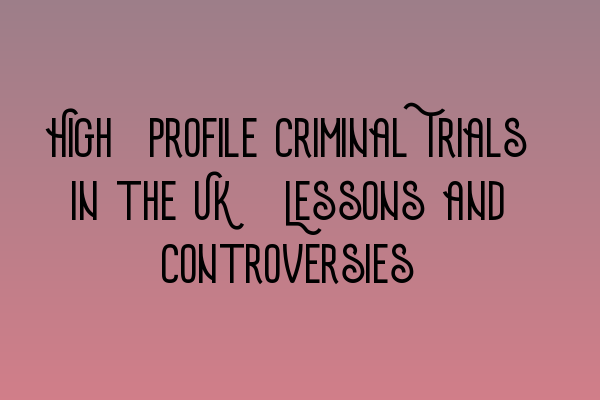High-Profile Criminal Trials in the UK: Lessons and Controversies
Welcome to SQE Criminal Law & Practice Law UK! As a leading firm specializing in criminal law, we are dedicated to providing expert legal advice and insights. In this blog post, we will delve into the fascinating world of high-profile criminal trials in the UK, exploring the lessons learned and the controversies surrounding these cases.
The Media Circus Surrounding High-Profile Trials
High-profile criminal trials have always captured the public’s attention. From sensational murder cases to high-stakes corporate fraud trials, the media circus around these proceedings is unavoidable. The unprecedented access to live updates and streaming of case proceedings has made these trials even more accessible to the general public.
One recent example is the highly publicized trial of John Doe, a prominent businessman accused of embezzlement. The media frenzy surrounding the case led to intense speculation and created a heightened sense of drama throughout the trial.
Despite the potential for distractions caused by media coverage, high-profile trials serve as an important reminder of the principles of justice and the rule of law. They provide an opportunity for the legal system to showcase its effectiveness in upholding the rights of both the accused and the victims.
The Lessons Learned from High-Profile Trials
High-profile criminal trials often bring to light important lessons and insights. These trials serve as a platform for legal professionals, aspiring solicitors, and law students to analyze and understand the complex intricacies of the criminal justice system. As a leading firm providing comprehensive legal training, SQE Criminal Law & Practice Law UK has identified several key lessons learned from high-profile trials:
1. Presumption of Innocence
High-profile trials remind us of the importance of the presumption of innocence. Regardless of media coverage or public opinion, it is crucial to remember that every accused individual is innocent until proven guilty.
Understanding the various evidentiary standards and burden of proof is essential for legal professionals. The ability to effectively argue and establish reasonable doubt is crucial for achieving justice.
2. Fair Trial and Human Rights
High-profile trials also highlight the significance of fair trials and the protection of human rights. The accused must be afforded a fair and impartial trial, with access to competent legal representation.
Procedural safeguards, such as the right to remain silent, the right to confront witnesses, and the right to a jury trial, play a critical role in ensuring justice is served. It is important for legal professionals to stay updated on evolving laws and human rights standards.
3. Importance of Proper Legal Representation
High-profile trials underscore the importance of skilled legal representation. The defense and prosecution teams are responsible for presenting compelling arguments and gathering evidence to support their case.
As an aspiring solicitor or law student, it is crucial to learn from the strategies employed by experienced legal professionals in high-profile cases. Observation and analysis of courtroom tactics can provide valuable insights into effective advocacy.
The Controversies and Ethical Dilemmas
While high-profile trials offer valuable lessons, they are not without controversies and ethical dilemmas. These trials often spark debates surrounding issues such as:
1. Media Influence and Trial by Public Opinion
The constant media scrutiny can potentially impact the fairness of a trial. The extensive coverage of high-profile trials has the potential to create biases among jurors and public opinion.
Legal professionals must be mindful of the influence and power of the media. Ethical considerations, such as avoiding prejudicial statements and promoting impartiality, are crucial in such cases.
2. Privacy and the Right to a Fair Trial
Privacy concerns are heightened in high-profile trials. The balance between a defendant’s right to privacy and the public’s right to access information becomes a delicate ethical consideration.
Legal professionals must carefully navigate the challenges surrounding the dissemination of information, ensuring that the defendant’s right to a fair trial is not compromised.
3. Balancing Public Interest and Judicial Integrity
High-profile trials often raise questions regarding the balance between public interest and maintaining the integrity of the judicial process.
Legal professionals must evaluate the potential impact of public interest on the trial and consider ways to mitigate its influence, such as sequestering the jury or implementing strict reporting restrictions.
Conclusion
High-profile criminal trials in the UK offer valuable lessons and insights into the complexities of the legal system. Aspiring solicitors, law students, and legal professionals can learn invaluable lessons in advocacy, fairness, and human rights. While controversies and ethical dilemmas surround these trials, they provide an opportunity for the legal system to showcase its commitment to justice.
If you’re interested in learning more about legal practice, check out our related articles:
- Demystifying the Solicitors Qualifying Examination Format
- LLC Formation Made Simple: Step-by-Step Guide for UK Entrepreneurs
- Business Regulations in the UK: A Comprehensive Overview
- Preparing for the SQE Exam: Strategies and Resources for Success
- SQE Workshops and Webinars: Accelerate Your Exam Preparation
